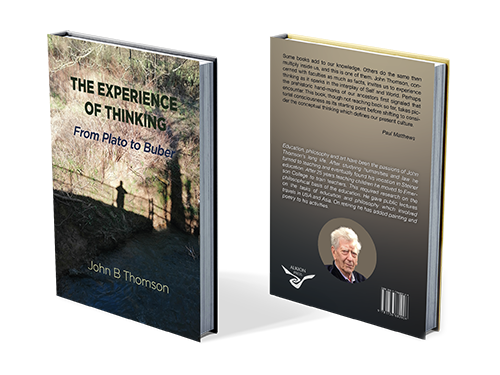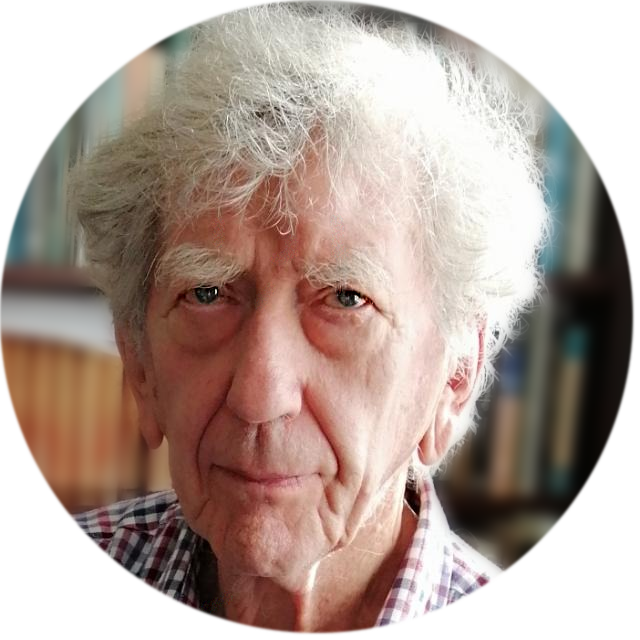John B Thomson
The Experience of Thinking
From Plato to Buber: 14 talks on major European thinkers and their viewpoints on what we can know about the world and the self and how we achieve this knowledge
The Book is now available!

Completely re-written, with more chapters, amazing illustrations
by Megan Thomson Connor and a preface by Paul Matthews.
by Megan Thomson Connor and a preface by Paul Matthews.
~
About the Series
These talks by John Thomson on European philosophers given at Emerson College around the year 2000 offer a view of each philosopher in their life situations. In the series from Plato to Martin Buber there is an underlying awareness that there are shifts of consciousness in writers living in successive periods. This awareness gives a fresh understanding of the ideas and assumptions present in each philosopher. ‘Riddles of Philosophy’ by Rudolf Steiner served as an inspiration for this viewpoint.

About the Author
Education, philosophy and art have been the passions of John Thomson's long life. After studying humanities and law he turned to teaching and eventually found his vocation in Steiner education. After 25 years teaching children he moved to Emerson College to train teachers. This required research on the philosophical basis of the education. He gave public lectures on the tasks of education and philosophy which involved travels in USA and Asia. On retiring he has added painting and poetry to his activities.
Education, philosophy and art have been the passions of John Thomson's long life. After studying humanities and law he turned to teaching and eventually found his vocation in Steiner education. After 25 years teaching children he moved to Emerson College to train teachers. This required research on the philosophical basis of the education. He gave public lectures on the tasks of education and philosophy which involved travels in USA and Asia. On retiring he has added painting and poetry to his activities.
~
“
I gave these talks nearly 20 years ago at Emerson College to an audience of about 30 people living in the area. The work of the College is based on the teaching of Rudolf Steiner. His books ‘The Philosophy of Freedom’ and ‘Truth and Knowledge’ are important to understand how we acquire knowledge of the world. It seemed to me that it is also important to know how this question has been treated by some of the outstanding European philosophers since Plato. The question can be briefly stated, ‘Epistemology deals with the encounter of the self and the world.’ The nature of self and world and their relationship are not fixed but show a slow change, an evolutionary process. This is not about progress, rather about increasing awareness and responsibility of the self. I have dealt briefly with Steiner’s philosophy as I gave several talks on it at the time. These were not recorded.
Steiner’s ‘Riddles of Philosophy’ (1923) is the source of the perception concerning change of consciousness as revealed in philosophy. It is supported by the creations in the arts as well as religious, political, legal, social and other cultural factors that appear in different epochs. I end with the philosophy of Martin Buber as his ‘I and Thou’ was my introduction to philosophy in the 50’s and confirmed for me that philosophy has to do with how we live our lives.
Steiner’s ‘Riddles of Philosophy’ (1923) is the source of the perception concerning change of consciousness as revealed in philosophy. It is supported by the creations in the arts as well as religious, political, legal, social and other cultural factors that appear in different epochs. I end with the philosophy of Martin Buber as his ‘I and Thou’ was my introduction to philosophy in the 50’s and confirmed for me that philosophy has to do with how we live our lives.
~
Episodes
Listen to this podcast in your browser now:
1
Plato (427 — 347 BC)
The theory of forms. The world of spirit accessible to heightened awareness endures. The sense world is transient, a world of becoming. The dialectical method of Socrates.
2
Aristotle (384 — 321 BC)
The idea is imminent in the sense object. Things are actualised in the sense world. This world of becoming is teleological (goal-oriented).
3
Augustine of Hippo (354 — 430 AD)
The prophet of personality. In his book ‘The City of God’ there are two cities, (1) love of self, contempt of god and (2) love of god, contempt of self. The way of freedom is through the soul’s abyss.
4
Thomas Aquinas (1227 — 1274 AD)
Philosophy as religion culminated with the Scholastics the greatest of whom was Aquinas. He was a Realist (ideas are real) as distinct from the Nominalists (ideas, names are just labels we apply to everything in the world.)
5
Francis Bacon (1561 — 1626)
René Descartes (1596 — 1650)
Baruch Spinoza (1632 — 1677)
René Descartes (1596 — 1650)
Baruch Spinoza (1632 — 1677)
The 17th century rejected the world views derived from the Greeks. Bacon emphasised a practical not a contemplative approach to nature. He proposed torturing nature to obtain her secrets. Descartes’ statement ‘I think therefore I am’ includes all the inner life, feelings and willing etc. The source of all knowledge is in the mind. Like Descartes, Spinoza’s thought was shaped by the New Science. But for him philosophy begins with what is ontological and logical, prior i.e. with the divine and nature. These are one.
6
John Locke (1632 — 1704)
George Berkeley (1685 — 1753)
David Hume (1711 — 1776)
George Berkeley (1685 — 1753)
David Hume (1711 — 1776)
Locke maintained that all knowledge is acquired and initially from the senses. All forms of nature can be explained mechanically by matter in motion and the impact of one body on another. Berkeley opposed this by denying the existence of inanimate matter and demonstrating that nothing exists save spiritual activity in God’s infinite mind and in human minds. Hume is the supreme sceptic. All our ideas are copied from our impressions. It is not reason which connects our ideas buts habits of mind. However hard we try we can never get away from ourselves and our perceptions.
7
Immanuel Kant (1724 — 1804)
The outstanding philosopher of the enlightenment. We have seen ideas as above the phenomena, as in the phenomena and now as separate from the phenomena. Kant’s task was to examine how we come to understand the world or rather how the world can be known by us. Having mapped out what is knowable, this world of appearances, he maintained there is an unknowable world of things-in-themselves.
8
Georg Wilhelm Friedrich Hegel (1770 — 1831)
His idealist philosophy examines that part of knowledge which is not derived from sense-perception, that is, the truth of the spirit (Geist). In the Phenomenology of Spirit he traces out the development of consciousness. Ideas are not just the product of the mind but permeate the world and constitute the substance of things.
9
Søren Kierkegaard (1813 — 1855)
One cannot find truth separate from one’s subjective experience as a living existing being. Hegel and Kant and other rational, systematic philosophers who remain detached observers are incapable of understanding the living processes that unfold before them. Existentialism later is inspired by his writings.
10
Edmund Husserl (1859 — 1938)
Rudolf Steiner (1861 — 1925)
Rudolf Steiner (1861 — 1925)
The new science that Husserl wished to found is ‘Phenomenology’ a method of exploring human consciousness. We are certain of our conscious awareness and when we analyse it we observe we are always conscious of something. Our awareness is intentional. This leads to questions of meaning and the intelligibility of the flow of events. For Steiner likewise meaning is not just given but it is the responsibility of the modern human to uncover meaning and one has to recognize how one participates in this uncovering.
11
Friedrich Nietzsche (1844 — 1900)
“God is dead.” This is his challenge to the optimism of the 19th century which pretended that religion and metaphysics were real but in fact were killed by science. Europe had lost the guidance which sustained it in past centuries. Higher spiritual values were replaced by the philistine and the mediocre.
12
Martin Heidegger (1889 — 1976)
He addresses directly the question what do we mean by thinking. It is not easy to grasp and any attempt to do so is entangled by his connection with National Socialism.
“That we are still not thinking stems from the fact that the thing itself that must be thought about turns away from man, has turned away long ago”. Another provocative statement is that we have lost the meaning of being as in human being. “We assert our existence or non-existence without knowing what it means. When people knew what it means they lived differently”.
“That we are still not thinking stems from the fact that the thing itself that must be thought about turns away from man, has turned away long ago”. Another provocative statement is that we have lost the meaning of being as in human being. “We assert our existence or non-existence without knowing what it means. When people knew what it means they lived differently”.
13
Bertrand Russell (1872 — 1970)
Ludwig Wittgenstein (1889 — 1951)
Ludwig Wittgenstein (1889 — 1951)
Philosophy and science have a common underlying methodology with Russell. All knowledge is proved by the methods of science. As a mathematician he looks for reliable knowledge based on outer experience freed from all subjectivity. The stuff of mental and physical worlds is the same. There is no big comprehensive system. Atomism replaces any organic view in the sense that understanding one part explains other parts by inference. Otherwise his philosophy is a radical investigation of social and political questions.
The work of Wittgenstein, this extraordinary thinker challenges accepted views in many disciplines. Impossible to summarize in a meaningful way. The interrelationship between language, thought and world establishes the basis of what can be known and not known. That philosophical statements are mostly meaningless and that philosophy is not a theory but an activity give a taste of his concerns. Meaning in language comes from its use, not, as is often supposed, from a source exterior to the word or sentence. His writings also propose new understanding of ethics, art and religion.
The work of Wittgenstein, this extraordinary thinker challenges accepted views in many disciplines. Impossible to summarize in a meaningful way. The interrelationship between language, thought and world establishes the basis of what can be known and not known. That philosophical statements are mostly meaningless and that philosophy is not a theory but an activity give a taste of his concerns. Meaning in language comes from its use, not, as is often supposed, from a source exterior to the word or sentence. His writings also propose new understanding of ethics, art and religion.
14
Martin Buber (1878 — 1965)
“To the human being the world is two-fold in accordance with his/her twofold attitude”. His book ‘I and Thou’ published in 1923 describes a foundation in dialogue for understanding the world. It opens a new pathway in philosophy which avoids the egocentric stand point of much traditional thinking.
A note from the production team
These lectures were restored from two sets of original recordings made many years ago. The quality of that recorded material was quite poor and it took over 100 hours of editing and two sound engineers to restore the quality to an acceptable level. Additionally, due to the fact that every lecture was recorded in different sound conditions, the resulting restoration brought different results, as some distortions were too intrinsic and could not be eliminated. Two lectures had to be re-recorded due to severe loss of quality and external disturbances. If you have questions of any kind regarding these lectures, you are welcome to contact us via the email below.
~
Subscribe to the podcast
and listen to it in your favourite application:
This podcast is made available through the work of different people
Roman Kuznetsov
Producer
Kim Murriera
Inspirier
Gregers Brinch
Composer
Ralf Sturm
Sound engineer
~
Systola GmbH
Sponsor





